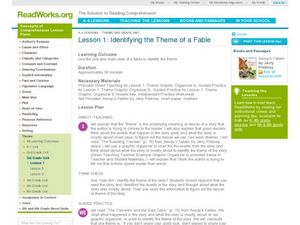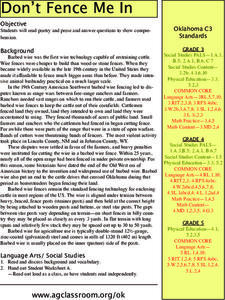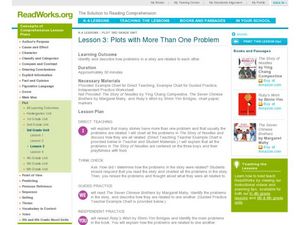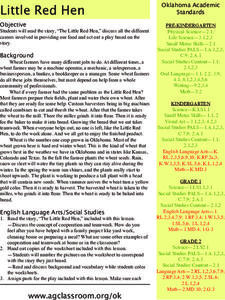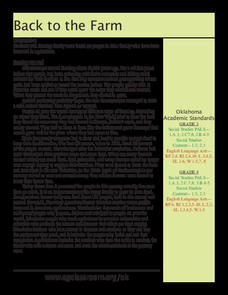Curated OER
Predicting a Solution to a Problem
Learners explore story structure. In this story structure literacy lesson, students listen to the story Ruby's Wish by Shirin Yim Bridges, stopping at points to identify a problem and predict possible solutions which are then written on...
Curated OER
Setting's Effect on a Character's Actions
Do the actions of a character in a story change based on the setting the writer provides? Learners explore the concept of character action in relation to story setting by investigating the setting and events in the story Science...
Curated OER
Lesson 2 : First and Last Sentences (Passage)
Remember that old skimming technique, where you'd read the first and last sentence of a paragraph to glean the main idea? That tried and true college trick is taught to third graders as a way to gather information while they read. They...
Curated OER
Identifying Theme of a Fable
Third graders understand how to find the theme of a fable. In this theme lesson, 3rd graders use graphic organizers to record the events of a fable. Students use that information to determine the lesson of the story. Students do a guided...
Curated OER
Oklahoma Stone Soup
Class members complete activities related to the story "Oklahoma Stone Soup." First, pupils read, discuss, and answer questions about the story. Next, to incorporate math into the lesson, learners make stone soup using a variety of...
Creative Educator
Amazing Animal Alliterations
Creatures can cause creativity! Alliteration can make writing more enjoyable and entertaining. Help your pupils grasp this concept by using animals as inspiration for alliterative sentences. Prepare your class for the activities by first...
Curated OER
Don't Fence Me In
Ensure that your class has a well-rounded understanding of new inventions, in this case barbed wired. Class members, after researching the history and development of barbed wire, assess its impact on cattle and the development of the...
Curated OER
Garden Grid
Basically, your class reads about different garden plants from an included handout and seed packets that you provide, and then uses a grid to plan out where to place the plants. They can practice counting with the seeds, grouping,...
Alabama Learning Exchange
Investigating the Weather
Learners study, record, and predict weather. They work in groups to create a weather word wall, research and make a barometer, and create a video about weather. They use the Internet to research weather.
Curated OER
Rising and Falling Actions
Rising and falling actions are big parts of how a plot moves through the course of a story, narrative, or novel. Youngsters use examples from their texts as they examine where the action rises and falls in the book, How My Parents...
Curated OER
Lesson 1: Identifying an Author's Purpose
Different types of text are written for very different reasons. Learners discuss the differences in writing to entertain, to inform, and to persuade their audiences. They work on identifying the author's purpose by reading and charting...
Curated OER
Facts and Opinions in a Variety of Genres
Here is a lesson dedicated to helping learners understand the differences between facts and opinions. They examine the first page of several books from the class library to determine if the book is fact or opinion based. A Venn diagram...
Curated OER
Plot with More Than One Problem
Every good story has a plot, and every good plot contains a conflict or problem. Third graders familiarize themselves and identify how problems in a story are connected. First as a class and then in small groups or individually, learners...
Curated OER
Lesson 2: Identifying an Author's Purpose (part 2)
Keep reinforcing the concept of author's purpose with a practice activity. After discussing the three purposes of writing, third graders will complete a graphic organizer intended to help them pin point textual evidence that proves...
Curated OER
Realistic Fiction
Explore the characteristics of realistic fiction by reading and then analyzing the book, Allie’s Basketball Dream by Barbara E. Barber. Using the I do, we do, you do model, learners practice identifying realistic fiction based on how...
Curated OER
A Story of Philanthropy
Help your class define philanthropy and recognize philanthropic activities. Ask them to identify examples of philanthropy in literature and explore the philanthropic deeds of themselves and others. To wrap up, create a class display with...
Curated OER
Ag In The Outfield
Young scholars explore baseball. This is a cross-curricular plan that includes math, history, and agriculture. Pupils use their five senses to observe the materials a baseball is made from and identify the agricultural products used. In...
Curated OER
Agriculture is a Cycle
What do a bicycle and the life cycle have in common? Cover this and more with the series of cross-curricular activities included in this plan. Learners do everything from making bracelets that represent the life cycle to checking out the...
Curated OER
Mighty Earth Movers
Note that although the publisher lists almost all of the Common Core standards for both math and language arts, you will most likely want to take the general topic and choose which area to focus on. Regarding math, pupils measure worms...
Curated OER
Piece by Piece
What do your pupils know about quilting? Read and discuss the information included here before sending class members off to create their own quilt blocks using construction paper. When they have completed their blocks, provide some time...
Curated OER
Just Lookin' For a Home
What is a boll weevil? Your class can find out that and more by following the activities included here. Pupils read an article, sing a boll weevil song, add to the song with their own original lyrics, illustrate the song, study the...
Curated OER
Little Red Hen
Pupils listen to a teacher reading of The Little Red Hen, identify the story elements and sequence them. They talk about different jobs associated with providing food and act out a play based on the story. Be aware that although several...
Curated OER
Explicit Information versus Drawing Conclusions
Third graders identify explicit information and draw conclusions from text. In this instructional lesson, 3rd graders review models of each question type (explicit and conclusion) and practice reading a passage to answer questions.
Curated OER
Back to the Farm
Read up on farming and ranching and connect this information to your learners' lives. After reading, send class members home to fill out a family tree and trace their family history, focusing on farming and ranching backgrounds. Once...





